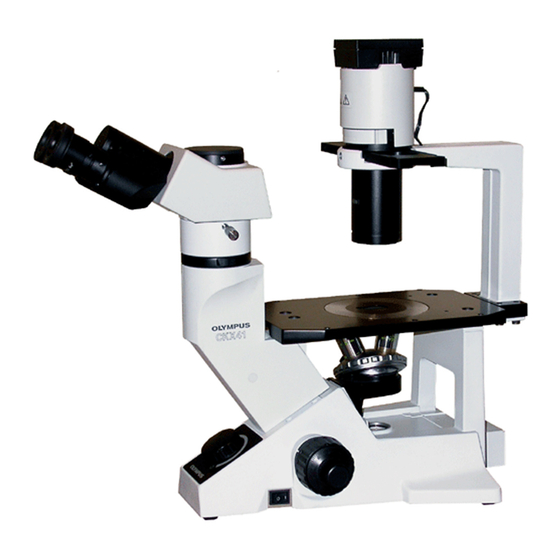- ページ 10
顕微鏡 Olympus CKX41のPDF 取扱説明書をオンラインで閲覧またはダウンロードできます。Olympus CKX41 36 ページ。 Reflected fluorescence system
Olympus CKX41 にも: 概要 (7 ページ), パンフレット&スペック (4 ページ), 修理マニュアル (43 ページ)

- 1. Table of Contents
- 1. General Precautions for Observation
- 1. Using the Controls
- 2. Important
- 2. Applicable Fluorescence Objectives
- 3. Nomenclature
- 3. Centering the Mercury Burner
- 4. Controls of each Module
- 4. Switching the Filter Slider
- 4. Troubleshooting Guide
- 4. Specifications
- 4. Assembly
- 4. Assembly
- 4. U-Excitation Filter Set Ckx-Nu (Optional)
- 5. Summary of Reflected Fluorescence Observation Procedure
- 5. Proper Selection of the Power Supply Cord
SUMMARY OF REFLECTED FLUORESCENCE OBSER-
VATION PROCEDURE
}If you view excitation light during observation, the light may be slightly glaring except when it is seen
through the excitation light protective shield. However, as the lamp housing incorporates a UV cut filter,
the excitation light is not hazardous even if it enters your eye. However, it is still recommended to view
the excitation light through the excitation light protective shield whenever possible.
When U-excitation is used, always be sure to view it through the excitation light protective shield.
}When it is required to interrupt observation for a short period, use the shutter (in 4 Filter slider).
}When searching for the observation target position on the specimen, it is recommended to set the
CKX41 for transmitted brightfield observation (possible by stopping down the aperture iris diaphragm) or
transmitted phase contrast observation to facilitate it. After locating the observation target position, turn
off the transmitted light illumination.
· Mount the objective suitable for the microscopy to be used.
· Centering the mercury burner.
Set the main switch to " " (ON) and wait until
the arc stabilizes (5 to 10 min.).
Place the specimen on the stage.
Engage the fluorescent mirror matching the
specimen in the light path.
Engage the objective in the light path, open the
shutter and bring the specimen into focus.
Adjust the brightness so that the entire field of
view is uniformly bright.
Start observation.
7
Preparation
Engage the ND filter in
light path as required.
Adjust the aperture
stop.
(Controls Used)
1 Main switch
2 Fluorescent mirror switching lever (P. 5,10)
3 Revolving nosepiece
4 Filter slider (Shutter)
5 Coarse/fine adjustment knobs
4 Filter slider (ND filter)
6 Collector focusing knob
7 Field iris diaphragm lever
(Page)
(P. 11,12)
(P. 14,15)
(P. 13)
(P. 17)
(P. 17)
(P. 15)
(P. 16)
